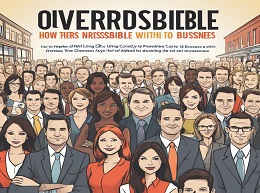The Entrepreneurial Instinct: How Everyone Has the Innate Ability to Start a Successful business

Unlock Your Potential with "The Entrepreneurial Instinct: How Everyone Has the Innate Ability to Start a Successful Small Business"
Entrepreneurship is often seen as a path for the daring few, but in "The Entrepreneurial Instinct: How Everyone Has the Innate Ability to Start a Successful Small Business," author Monica Mehta argues that the ability to start and run a successful business is embedded within all of us. Through a mix of scientific research, compelling anecdotes, and practical advice, Mehta makes a convincing case that entrepreneurial skills can be awakened and honed by anyone. This review will explore the key themes and insights of the book, providing examples to illustrate the ideas and engaging readers with the actionable wisdom Mehta offers.
The Myth of the Born Entrepreneur
Monica Mehta begins by debunking the myth that entrepreneurs are born with a special set of talents. Instead, she posits that entrepreneurial skills are inherent in everyone and can be developed through experience and practice. This democratization of entrepreneurship is a refreshing perspective, suggesting that anyone, regardless of background or natural inclination, can become successful in business with the right mindset and tools.
Example: Sara Blakely’s Journey
Sara Blakely, the founder of Spanx, is an excellent example of Mehta’s thesis. Blakely had no background in fashion or business. She was a door-to-door fax machine salesperson before she invented Spanx. Her success came from identifying a problem, developing a solution, and persevering through numerous rejections before her product took off. Blakely's story exemplifies how entrepreneurial success can stem from persistence, creativity, and a willingness to take risks—qualities that can be cultivated rather than innate traits.
Understanding the Brain’s Role
One of the book’s most compelling sections delves into the neuroscience of entrepreneurship. Mehta explores how certain brain functions, such as pattern recognition and risk-taking, play a crucial role in entrepreneurial success. She explains how these functions can be enhanced through practice and experience, making entrepreneurship more accessible to all.
Practical Insight: Enhancing Risk-Taking Abilities
Mehta suggests that individuals can train their brains to become more comfortable with risk through gradual exposure and positive reinforcement. This can be as simple as making small bets in everyday life and building up to larger entrepreneurial ventures. By incrementally increasing the stakes, individuals can develop a more resilient and adaptive approach to risk.
The Role of Genetics and Environment
While Mehta acknowledges that genetics can influence certain traits beneficial for entrepreneurship, such as resilience and optimism, she emphasizes the significant impact of environment and experiences. This means that nurturing an entrepreneurial mindset can be achieved through the right experiences and educational approaches.
Example: The Kauffman Foundation’s Approach
The Kauffman Foundation, which supports entrepreneurial education, has implemented programs that encourage experiential learning and real-world business challenges. These programs help participants develop entrepreneurial skills by simulating the pressures and decision-making processes of running a business, reinforcing Mehta’s argument that the right environment can cultivate an entrepreneurial instinct.
Embracing Failure as a Learning Tool
A recurring theme in "The Entrepreneurial Instinct" is the importance of viewing failure as a learning opportunity rather than a setback. Mehta stresses that failure is an integral part of the entrepreneurial journey and that resilience is built through overcoming challenges and learning from mistakes.
Example: Thomas Edison’s Persistence
Thomas Edison’s quote, “I have not failed. I’ve just found 10,000 ways that won’t work,” encapsulates this philosophy. Edison’s numerous experiments and failures ultimately led to the invention of the light bulb, demonstrating that persistence and a positive attitude towards failure are crucial for innovation and success.
The Power of Networking and Mentorship
Mehta highlights the importance of building a strong network and seeking mentorship as vital components of entrepreneurial success. She provides practical advice on how to find mentors, build meaningful connections, and leverage these relationships to gain insights and opportunities.
Practical Insight: Finding the Right Mentor
Mehta advises aspiring entrepreneurs to seek mentors who not only have experience in their industry but also align with their values and vision. She suggests starting with informal conversations, attending industry events, and being proactive in seeking advice and feedback. The right mentor can provide guidance, open doors, and offer a different perspective on challenges.
Leveraging Small Wins
Another practical strategy Mehta discusses is the concept of leveraging small wins to build momentum. By setting and achieving smaller, attainable goals, entrepreneurs can build confidence and create a sense of progress that fuels larger ambitions.
Example: Kickstarter Success Stories
Numerous successful products on Kickstarter began with modest goals, gradually building support and achieving success through incremental progress. For instance, Pebble, the smartwatch company, started with a crowdfunding campaign that set a modest goal but ended up raising over $10 million. Each small win contributed to their larger success, illustrating Mehta’s point about the power of incremental progress.
Case Study: Airbnb’s Evolution
Airbnb’s story is a prime example of how ordinary people can achieve extraordinary success through entrepreneurship. Founders Brian Chesky and Joe Gebbia started with a simple idea of renting out an air mattress in their apartment to make extra money. Through persistence, creative problem-solving, and leveraging their network, they transformed this small idea into a billion-dollar company that revolutionized the hospitality industry.
Case Study: Warby Parker’s Disruption
Warby Parker disrupted the eyewear industry by offering stylish, affordable glasses online. Founders Neil Blumenthal, Andrew Hunt, David Gilboa, and Jeffrey Raider started with a problem they personally experienced: the high cost of eyeglasses. By addressing this issue and using innovative marketing strategies, they created a successful business that continues to grow and inspire.
Awakening Your Entrepreneurial Instinct
"The Entrepreneurial Instinct" by Monica Mehta is a powerful reminder that entrepreneurship is not reserved for a select few but is within reach for anyone willing to cultivate the necessary skills and mindset. Mehta’s blend of scientific research, practical advice, and real-world examples makes this book an invaluable resource for aspiring entrepreneurs.













